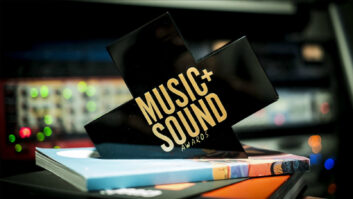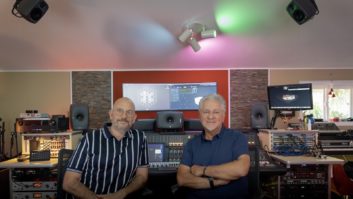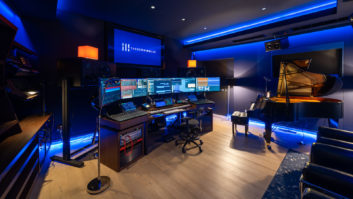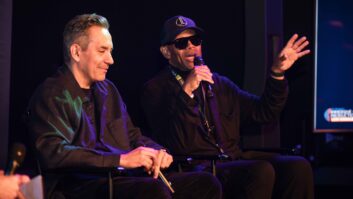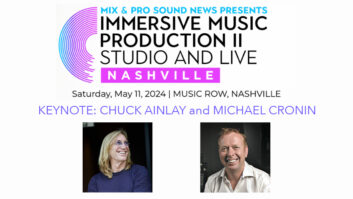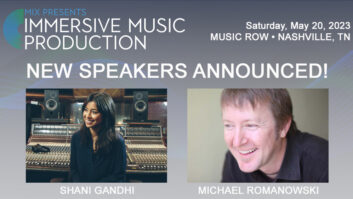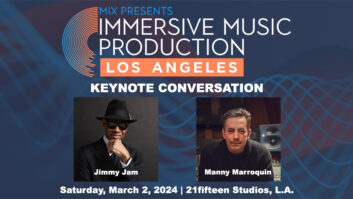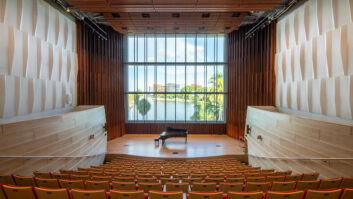Although the benefits of spending one’s days surrounded by simple beauty and the charms of our Colonial past can’t be discounted, it’s still not easy making a living as a creative musician in the rolling hills of Connecticut. Michael Terry is a native son who’s making a go of it. He staked claims from Nashville to Canada before settling back down in Trumbull, Conn., to open his own project studio.
Terry operates The Music Lab (with his wife, Tricia, who handles the business end of things) and finds that he can maximize his time and the facility’s resources best by splitting his work three ways: He writes and composes commercial music for radio, television and corporate clients, produces outside songwriters and scores films.
The Music Lab has 24 tracks of original blackface Alesis ADATs running in conjunction with MOTU’s Digital Performer. On a 200MHz Mac Terry easily gets another 12 to 16 tracks of digital audio recording, and his experience integrating DP into the studio as a hard disk recorder has proven better for The Music Lab than working with Pro Tools. “Pro Tools is a great system,” Terry says, “but I’ve found far less synching problems-remember we do a lot of video work in here-using DP instead. The editing functions are very easy to work with, the effects are quite useful and everyone knows that Performer is a great sequencer.”
A singer and musician (he played drums back in high school in a band that featured John Scofield on guitar, and now plays guitar and keyboards himself), Terry has also had some success as a composer. Mickey Gilley recorded his tune “Texas Heartache,” and Terry penned Canadian Top 40 hits during his stay north of the border. One of the hats that Terry wears these day is music director for American Comedy Network. This work involves the production of parody tunes for radio broadcast. “Our job is to keep the place busy,” Terry says, “and I’m grateful for the amount of business that we get from the ACN. It’s not the most creative aspect of what we do, but parodying songs that have great production values keeps me learning.”
Most project studio owners who need outside clients to augment the work they get for themselves are faced at some point with setting limits on the kind of people they deal with. Semi-professionals often bring hassles that outweigh the benefits to smaller rooms. “Working with outside songwriters is another leg of our business, to be sure,” Terry says. “Fortunately, we’re able to be very selective with respect to the people who we work with. I produce a dozen or so songs each year for outside writers. I’ll also do drum programming for people who want to cut some tracks in their homes but don’t have a good MIDI setup or just don’t feel comfortable programming drums. Generally, someone will bring in an ADAT rough mix of their tune, and I’ll lay a drum program back to an ADAT tape. How wide the split will be depends on how extensive their ADAT system is.”
As much as he enjoys being a working studio owner, the radio and song demo work essentially serves to keep Terry’s business running when The Music Lab is not booked doing the work that excites him most-scoring for film. His break in this field came several years ago, when local filmmaker Joe Consentino tapped him to score Muhammad Ali, The Whole Story, Consentino’s tribute to the great fistmeister that aired on TNT. Interestingly, his work on the Ali project helped Terry close a circle with a success story who lives a few miles down the road, Brian Keane.
“Brian is a very gifted musician,” Terry says, “a terrific guitar player and composer. I knew that his film scoring career had escalated to the point where he was using outside orchestrators to flesh out some of his projects.” Keane liked Terry’s score to the Ali film and invited Terry to the party. In the last several years, Terry’s worked on about a dozen projects with his neighbor, including HBO’s Reflections On Ice and The Babe Ruth Story, and the PBS documentary A Science Odyssey.
With an expanding film reel, Terry is finding more scoring work on his own. Earlier this year he scored a Lifetime “Intimate Portrait” study of Gloria Steinem, which was directed by Oscar winner Lee Grant for Joseph Fuery Entertainment. This work, scored at The Music Lab, is now serving as a prelude to a second gig for the “Intimate Portrait” series. “We’ll be working with Lee Grant and JFE for a second time,” Terry says. “This program will look at the life and career of Mia Farrow, and will air later this year.”
